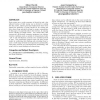131 search results - page 16 / 27 » If you have time, save energy with pull |
129
click to vote
COMCOM
2004
15 years 1 months ago
2004
Storage, memory, processor, and communications bandwidth are all relatively plentiful and inexpensive. However, a growing expense in the operation of computer networks is electric...
101
click to vote
OSDI
2002
ACM
16 years 1 months ago
2002
ACM
In this paper we demonstrate the benefits of application involvement in operating system power management. We present Coop-I/O, an approach to reduce the power consumption of devi...
ISLPED
2000
ACM
15 years 5 months ago
2000
ACM
Recovering and reusing circuit energies that would otherwise be dissipated as heat can reduce the power dissipated by a VLSI chip. To accomplish this requires a power source that ...
133
click to vote
CODES
2009
IEEE
15 years 8 months ago
2009
IEEE
Time redundancy (rollback-recovery) and hardware redundancy are commonly used in real-time systems to achieve fault tolerance. From an energy consumption point of view, time redun...
SIGCOMM
2010
ACM
15 years 1 months ago
2010
ACM
Data centers are a major consumer of electricity and a significant fraction of their energy use is devoted to cooling the data center. Recent prototype deployments have investigat...

